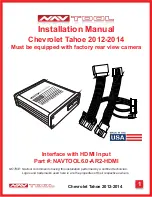
JUMP-STARTING PROCEDURES
WARNING!
•
Take care to avoid the radiator cooling fan whenever the hood is raised.
It can start anytime the ignition switch is ON. You can be hurt by the
fan.
•
Do not attempt to push or tow your vehicle to get it started. Vehicles
equipped with an automatic transmission cannot be started this way.
Unburned fuel could enter the catalytic converter and once the engine
has started, ignite and damage the converter and vehicle. If the vehicle
has a discharged battery, booster cables may be used to obtain a start
from another vehicle. This type of start can be dangerous if done
improperly, so follow this procedure carefully.
•
Battery fluid is a corrosive acid solution; do not allow battery fluid to
contact eyes, skin, or clothing. Don’t lean over battery when attaching
clamps or allow the clamps to touch each other. If acid splashes in eyes
or on skin, flush contaminated area immediately with large quantities
of water.
•
A battery generates hydrogen gas, which is flammable and explosive.
Keep flame or spark away from the vent holes.
•
Do not use a booster battery or any other booster source with an output
that exceeds 12 Volts.
•
The battery in this vehicle has a vent hose that should not be discon-
nected and should only be replaced with a battery of the same type
(vented).
NOTE:
The battery is stored under a hinged access
cover in the load floor in the cargo area. Remote battery
terminals are located in the engine compartment for
jump-starting.
1. Wear eye protection and remove any metal jewelry
such as watchbands or bracelets that might make an
inadvertent electrical contact.
2. When boost is provided by a battery in another
vehicle, park that vehicle within booster cable reach, but
do not allow the vehicles to touch one another.
WARNING!
Do not permit vehicles to touch each other as this
could establish a ground connection and personal
injury could result.
WHAT TO DO IN EMERGENCIES
371
6
Summary of Contents for 2008 DX-49 Magnum SRT8
Page 1: ...Magnum SRT8 O W N E R S M A N U A L 2 0 0 8...
Page 4: ......
Page 7: ...INTRODUCTION 5 1...
Page 10: ......
Page 80: ......
Page 110: ...108 UNDERSTANDING THE FEATURES OF YOUR VEHICLE...
Page 111: ...UNDERSTANDING THE FEATURES OF YOUR VEHICLE 109 3...
Page 112: ...110 UNDERSTANDING THE FEATURES OF YOUR VEHICLE...
Page 176: ...PREMIUM INSTRUMENT CLUSTER 174 UNDERSTANDING YOUR INSTRUMENT PANEL...
Page 266: ...264 UNDERSTANDING YOUR INSTRUMENT PANEL...
Page 274: ......
Page 317: ...STARTING AND OPERATING 315 5...
Page 364: ......
Page 434: ......
Page 442: ......
Page 453: ...INDEX 10...
















































